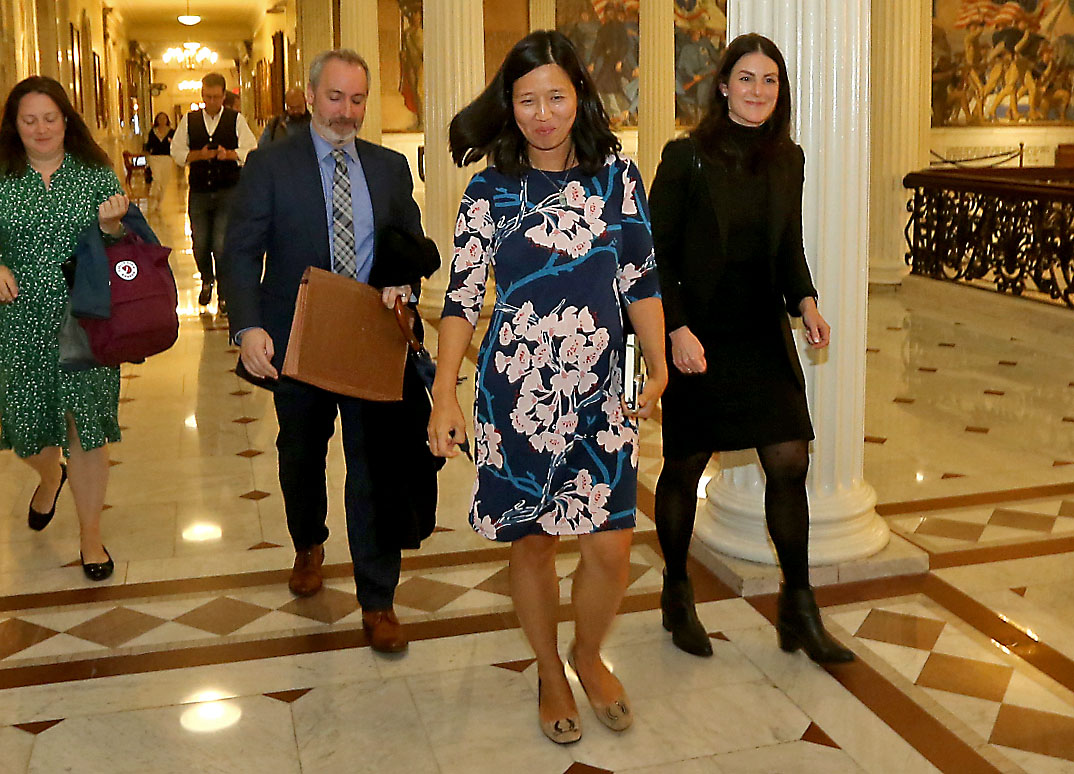
Spilka, Wu discuss tax proposal during private meeting that ends without ‘consensus,’ pol says
A summit between Senate President Karen Spilka, Mayor Michelle Wu, Boston senators, and the business community to discuss a controversial tax proposal from the mayor apparently ended without “consensus,” according to one local lawmaker present at the meeting.
After months of inaction by the Senate on a plan that would shift more of the city’s property tax burden onto the business community, Wu and Spilka met for roughly an hour Thursday at the State House to go over the proposal, though it concluded with only pledges to continue conversations.
Sen. Nick Collins, a South Boston Democrat who sat in on the conversation, said there was “no consensus today” on Wu’s tax measure, which has generated hefty resistance from a commercial sector that argues it would hurt small businesses.
“I think it was a good, healthy conversation that will continue. Where it goes from here is uncertain at the moment,” Collins told reporters. “There wasn’t an immediate follow-up meeting scheduled.”
Wu has said her plan, which would put more of a tax burden on the business community, is necessary to beat back a potential 33% increase in residential tax bills. A pair of Boston city councilors have offered an alternative to Wu’s proposal.
Wu’s idea earned a green light this summer from the House, which struck a deal with the mayor that includes a city-level executive order to provide tax relief to small businesses and limit the scope and length of the tax shift.
But it has been met with skepticism in the Senate, which did not act on the matter as the Legislature’s time for formal business concluded this summer. Lawmakers can still advance Wu’s proposal but any one single senator can put up a blockade if they disagree with it.
Wu declined to detail the “lovely private conversation” she had with Spilka as she left the State House.
“I really try not to duck you all on a regular basis but I had a great private conversation,” she told a group of reporters while entering an elevator.
Spilka’s staff also declined to make her available for questions. But in a statement after the meeting had ended, a spokesperson for the Senate president said it “was a convening of stakeholders.”
“The Senate president has long believed that, in dealing with complex issues, it is important to get the interested parties together in a room and listen to each other. It is the Senate president’s hope that the City of Boston and the stakeholders continue these conversations going forward,” the spokesperson said.
Sen. Sal DiDomnico, an Everett Democrat whose district includes portions of Boston, and Sen. Michael Rush, a West Roxbury Democrat, declined to speak with reporters as they left the meeting.
Greater Boston Chamber of Commerce President Jim Rooney and Boston Municipal Research Bureau Interim President Marty Walz also sat in on the talks.
Sen. Lydia Edwards, an East Boston Democrat who participated in the discussions, said she does not disagree with Wu’s proposal.
“I think we’re trying to get the sides to work it out themselves,” she said of the mayor and business community. “The fact that both sides came together in this convening, I think, demonstrated goodwill on both sides wanting to move forward.”
After the Senate did not act on the bill in July, Wu criticized the chamber.
“If this does not happen, every single resident in the City of Boston will know that their taxes are going up because the Senate did not vote through that last step,” she said during a radio interview at the time.
That prompted a sharp comment from Spilka, though she said weeks later that she was “open to continuing conversations” with City Hall.
“Blaming the Senate may be politically convenient for the mayor, but it does nothing to improve a policy proposal that has been widely questioned by watchdog agencies and could do serious damage to Boston’s economy,” her spokesperson said in a statement in response to Wu’s comments on the radio.
Mayor Wu didn’t have anything to say as she left the State House. (Stuart Cahill/Boston Herald)


